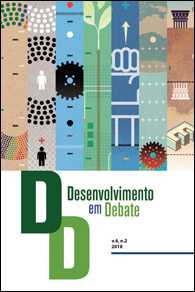Public goods as drivers of growth/development
Keywords:
Development, Growth, Economic TheoryAbstract
This paper frames a broader reconstruction of the evolution of our understanding of the dynamics of an economy through the role assigned to a variety of Pure and Non Pure Public Goods(NPPGs) as development drivers and value creators. It outlinesthe convergence of two distinct, though major theoretical traditions: the theories of growth/development, on one side, and the debate over role and efficiency of State/Vertical Integrated Firms v/s Market in the provision of goods. Coase (1932) put forward a theory of why either one prevails, as a function of a broad category of transaction costs.
Downloads
References
ACEMOGLU, D; JOHNSON, C. & ROBINSON, J. The Colonial Origins of Comparative Development: An Empirical Investigation. American Economic Review, v. 81, n. 5, pp. 1369-1401, 2001.
ACEMOGLU, D.; JOHNSON, S. &. ROBINSON, J. Reversal of Fortune: Geography and Institutions in the Making of the Modern World Income Distribution. Quarterly Journal of Economics, v. 107, pp. 1231-1294, 2002.
BENKLER, J. Coase’s Penguin, or, Linux and The Nature of the Firm. The Yale Law Journal, v. 112, pp. 371-446, 2002.
BOYLE, R. The Second Enclosure Movement and the Construction of the Public Domain. Law and Contemporary Problems, v. 66, pp. 33-74, 2003.
COASE, R. The Problem of Social Cost. The Journal of Law & Economics, v. 3 (Oct., 1960), pp. 1-44, 1960.
COLEMAN, J. The Foundations of Social Theory. Cambridge: Harvard University Press, 1990.
DASUPTA, P.; SEGELDIN, I. Social capital. A multifaceted perspective. Washington DC: The World Bank, 2000.
DESAI, M. Public goods, a historical perspective. in Kaul, I. et al. (Eds.), Providing Global Public goods. Oxford: Oxford University Press, 2003.
ELLICKSON, R. C. Order without Law: How Neighbors Settle Disputes. Cambridge: Harvard University Press, 1991.
KASLIWAL, P. New rents economy- US unequality in the 21st century. Revista de Economia Contemporânea, v. 20, n. 3, 2016.
KAUL, I. Providing Global Public Goods: Managing Globalization. Oxford Scholarship Online: November, 2003.
OSTROM E. Governing the commons: the evolution of institutions for collective action. Cambridge, UK: Cambridge University Press, 1991.
OSTROM, E. How types of goods and property right jointly affect collective action. Journal of Theoretical Politics, v. 15, n. 3, pp. 239-270, 2003.
PUTNAM, R. (with R.LEONARDI & R. NANETTI). Making Democracy Work: Civic Traditions in Modern Italy. Princeton: Princeton University Press, 1993.
HESS, Ch. Mapping the new commons. Presented at “Governing shared resources: Connecting local experience to global challenges”. The 12th Biennial Conference of the International Association for the Study of the Commons, University of Gloucestershire, Cheltenham, England, July 14-18, 2008.
LAZZERETTI, L. The creative capacity of culture and the new creative milieu. In: Handbook of industrial districts. London: Edward Elgar Publishing, 2009.
MELLO, M.T.L. 'Property' Rights and the Ways of Protecting Entitlements - an interdisciplinary approach. Revista de Economia Contemporânea, v. 20, n. 3, pp. 430-457, 2016.
MAGNAGHI, A. Il progetto locale. Verso la coscienza di luogo. Torino: Bollati Boringhieri, 2010.
NELSON, R. R. & WINTER, S.G. An Evolutionary Theory of Economic Change. Cambridge: The Belknap Press of Harvard University Press, 1982.
NORTH, D. & THOMAS, R. P. The Rise of the Western World. Cambridge: Cambridge University Press, 1973.
NORTH, D. Institutions, Institutional Change and Economic Performance. Cambridge: Cambridge University Press, 1990.
OLSEN, M. The Logic of Collective Action. Cambridge: Cambridge University Press, 1965.
PAGANO. U. & VATIERO M. Costly institutions as substitutes: novelty and limits of the Coasian approach. Journal of Institutional Economics, v. 11, n. 2 (Ronald F: Coase Memorial Issue), pp. 265-281, 2015.
ROMER, P. Ideas Gaps and Object gaps in economic development. Journal of Monetary Economics, n. 32, pp. 543-573, 1993.
ROMER, P. The Origins of Endogenous Growth. The Journal of Economic Perspectives, v. 8, n. 1, p. 3-22, 1994.
SAMUELSON, P. The Pure Theory of Public Expenditure. The Review of Economics and Statistics, v. 36, n. 4, pp. 387-389, 1954.
SOLOW, R. M. Perspectives on Growth Theory. Journal of Economic Perspectives; v. 8, pp. 45-54, 1994.
SOLOW R. M. A Contribution to the Theory of Economic Growth. Quarterly Journal of Economics, v. 70, pp. 65-94 , 1956.
STIGLITZ, J. Knowledge as a global public good. In: Kaul, I. et al. (Eds.), Providing global public goods. Oxford: Oxford University Press, 2003.


